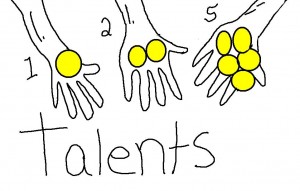 God is a gambler! He takes risks with me.
God is a gambler! He takes risks with me.
(Prov 31:10-13, 19-20, 30-31; 1The 5:1-6; Mt 25:14-30)
The Kingdom of God is like…
Often Jesus comes up with stories that speak a contemporary language. In the gospel, today, Jesus shows some sophisticated knowledge of market economy. He seems to be aware of investment, interest rates, and stocks. He would have surprised the disciples, to whom the parable is addressed, as a natural hedge-fund manager.
It would seem very trendy, therefore, to develop a sermon on entrepreneurship based on the gospel text of today. But interpreted within the larger agenda of the mission of Jesus the parable is not about anything material. “The kingdom of heaven is like…” (Mt 25:14), that is how the gospel narration begins. It is not even about one’s talents in music, public speaking or organisation! We shouldn’t be misled by the word, ‘talent’.
Even at the risk of being branded as a ‘spiritualist’, I would like to suggest that the gospel text of today is about opportunities that God offers us so that we might commune with him, and in so doing be compassionate to others. How do we respond to these opportunities? St Paul on several occasions lists spiritual gifts. “The fruit of the Spirit,” he says, “is love, joy, peace, patience, kindness, goodness, trustfulness, gentleness and self-control… (Gal 5:22-23; see also 1Cor 12 & 13; Col 3:12). The epistle of Peter makes a very comprehensive statement, pointing out to the practical implication of these spiritual gifts. “Do your utmost to support your faith with goodness, goodness with understanding, understanding with self-control, self-control with perseverance, perseverance with devotion, devotion with kindness to the brothers, and kindness to the brothers with love.” And he concludes, “The possession and growth of these qualities will prevent your knowledge of our Lord Jesus Christ from being ineffectual or unproductive” (2Pet 1:5-8).
The gospel text of today is about these gifts. (Of course, as I have said, these gifts which are spiritual/human also help us relate to people around us, and function in the world with a sense of purpose and wellbeing). And these are the ‘talents’’ that God gambles with.
In the parable of today, each one is given according to their ability (Mt 25: 15). Yet, this was lavish. A ‘talent’ was not a small money, a mere pittance. According to some literature, a Greek Talent of silver meant nine man-years of skilled labour, or 6,000 days’ wage. A Talent of gold would be even more (may be 20 years’ wage). Think of the gifts that God has lavished on us (2Pet 1:3; 1Jn 3:1)? In fact, St Paul tells us, in his first letter to the Corinthians: “Now, the Spirit we have received is not the spirit of the world but God’s own Spirit, so that we may understand the lavish gifts God has given us” (1Cor 2:12).
God, the gambler
When the Master entrusts the servants with his property (Mt 25:14) he was basically turning them into managers. They are no longer servants, they are now masters themselves. But did everyone take on the responsibility?
I find it always interesting to compare Matthew’s version of the parables with the Lukan version, or to compare one parable with another within the same gospel, as you might often notice in my sermons. I feel this approach sheds some interesting light on how the parable could be interpreted. For instance, it would be interesting to compare and contrast the parable of today with the Lukan version of the parable of minas (or ‘pounds’, as NJB has it). There are very interesting similarities and differences.
But I would like to draw some parallels between the parable of the talents and the parable of the sower (Mt 13:3-9; Lk 8:5-8). In both these parables, the master takes risks by offering opportunities to different types of people or different terrain of land. But the responses are different. Even if in the gospel of today, the ‘wicked and lazy’ servant becomes a victim of his own lethargic attitude to life and his own narrow judgement of the Master (Mt 25: 25-26), the Master continues to be generous with others. The sower continues to sow!
So here is the underlying message. God is a gambler. He takes risks with me. I would like to respond. Bearing fruits is not out of fear of his punishment, but it is about the purpose and meaning of my own life. This is the glory of God!
We say God’s love is unconditional. True. I do believe there is one condition, though: our own happiness and wellbeing! This is what God expects and enjoys. Could wellbeing be an outcome of taking risks on our own part sometimes? And would this imply “launching out into the deep” (Lk 5:4)?